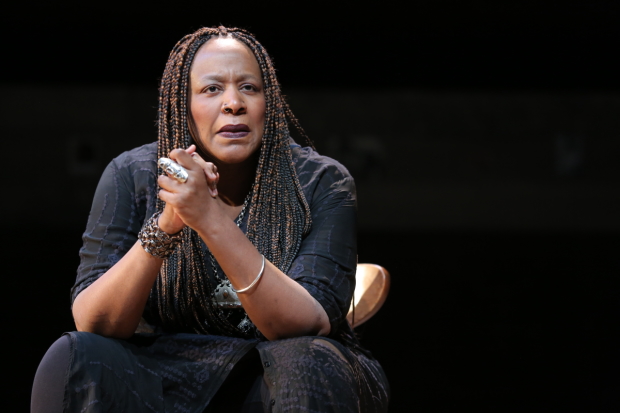
(© Joan Marcus)
We tend to lionize the dead, remembering them as far better people than they actually were. This is certainly true when it comes to the art of the eulogy, the theatrical soliloquy delivered in tribute to the recently departed. In Forever, Dael Orlandersmith's new solo performance at New York Theatre Workshop, she performs what could only be described as a eulogy to her mother, albeit one distinctly more honest than you would typically encounter at an American funeral. She implicitly asks: What if we used this opportunity to paint a realistic portrait of the subject, rather than a touched-up glamour shot? Is the latter really more respectful than the former, or is it just easier to tell some beautiful lies and move on? The result of this experiment is a mixed bag of compelling ambiguity and boring unprocessed emotion.
Orlandersmith (a Pulitzer Prize finalist for her 2002 play Yellowman) frames her story by describing a trip to Paris' Père Lachaise Cemetery, final resting place of Oscar Wilde, Honoré de Balzac, and Jim Morrison. Surrounded by these great poets, she can't help but be haunted by the ghost of her mother. Two decades deceased, her mother Beula's influence (both positive and negative) is still inextricably burned onto Orlandersmith's psyche. It was Beula, who first introduced her to a world of poetry and art. Through her actions, she also gave her daughter a primer on malice, addiction, and emotional blackmail.
We're transported back the Harlem apartment where Orlandersmith spent her formative years with the scotch-swilling Beula, a woman whose charm was matched only by her cruelty. "Wanna know why no one likes you?" she asks the younger version of herself, using Beula's voice. "You're fat / hateful / disgusting."
"MOMMY MONSTER! MOMMY MONSTER," Orlandersmith screams, adopting a little girl voice. This solo confessional occasionally feels like a therapy session in which we are the silently observing psychoanalysts. As she works out these painful memories, one's mind has a tendency to wander.
This all takes place on Takeshi Kata's austere set of synthetic wooden platforms. Orlandersmith's real family photos ring the stage, mounted against what appears to be gray bulletin-board fabric. A table with two chairs sits slightly center-right, the only piece of furniture in what could pass for a brand-new contemporary-style apartment.
Despite the wide-open spaces of this set, director Neel Keller uses only a fraction of it in his staging. Orlandersmith remains confined to the raised platform center stage, sometimes moving downstage to sit on the steps. Much of the blocking seems forced and nonessential, as if Keller and Orlandersmith suddenly remembered they were in a theater and needed to move every few minutes. Otherwise, this event would be little more than a memorized public reading of a short story.
Orlandersmith's imagery is so rich, her language so lyrical, that this piece could easily be just as satisfying to a reader as to an audience member. She coldly describes Beula's love as, "a ninety proof scotch-filled chain-smoked kind of love." She remains guarded and sturdy while sharing her play's most harrowing passage, a gruesome description of her rape at the hands of an intruder. Paradoxically, Forever is at its strongest when Orlandersmith's performance is most understated, when she allows her words to speak for themselves without a lot of melodramatic coloring.
Audience members are invited to post their own messages of tribute to the dead on the gray board that extends into the house. None of these little notes will likely match Orlandersmith's ode to her mother in terms of searing honesty or clear-eyed remembrance. One can't help but admire her drive to eschew sentimental nostalgia for a deeper (and more difficult) understanding of the truth behind one woman's life.









